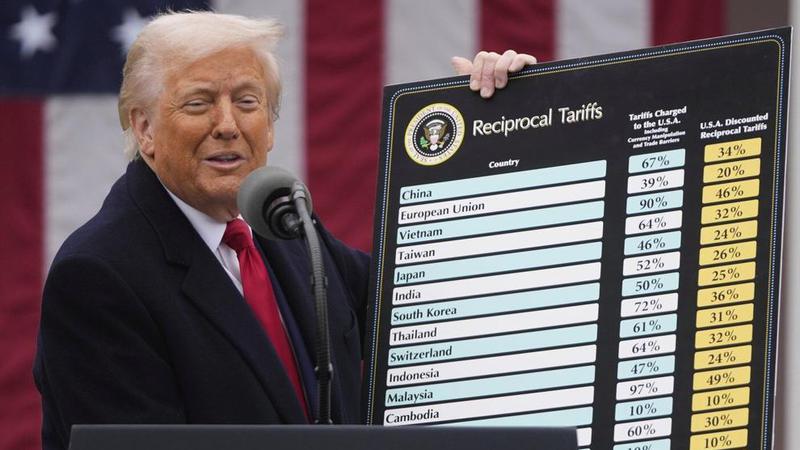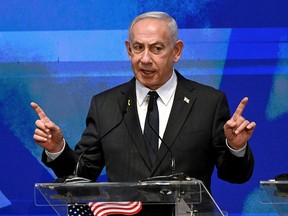Politics
U.S. Appeals Court Rules Many Trump Tariffs Illegal but Maintains Levies

A federal appeals court in the United States has ruled that numerous tariffs imposed by former President Donald Trump are illegal, yet the court has allowed these levies to remain in effect as the case progresses to the Supreme Court. On September 29, 2023, the U.S. Court of Appeals for the Federal Circuit determined that Trump’s “Liberation Day” tariffs and his tariffs related to fentanyl exceeded the authority granted by the national security statute used to enact them.
In a 7-4 decision, the judges stated, “It seems unlikely that Congress intended to … grant the President unlimited authority to impose tariffs.” They pointed out that the statute used, known as the International Economic Emergency Powers Act (IEEPA), does not reference tariffs or include procedural safeguards limiting the President’s power.
Following the ruling, Trump took to social media, asserting, “ALL TARIFFS ARE STILL IN EFFECT!” He described the court as “highly partisan” and warned that the removal of these tariffs would be catastrophic for the country’s economy. He stated, “It would make us financially weak, and we have to be strong.”
The Liberty Justice Center, which represented some businesses challenging the tariffs, echoed the court’s concerns, noting that “the president cannot impose tariffs on his own.” Trump utilized the IEEPA to impose tariffs on a wide range of imports, claiming a national emergency to justify these measures. The IEEPA does not explicitly mention tariffs, and the U.S. Constitution designates the power to regulate taxes and tariffs to Congress.
The Liberty Justice Center emphasized that “IEEPA does not give him unlimited, unilateral tariff authority,” and asserted that the ruling protects American businesses and consumers from the adverse effects of these tariffs.
The White House has defended Trump’s use of tariffs, with spokesman Kush Desai stating, “President Trump lawfully exercised the tariff powers granted to him by Congress to defend our national and economic security from foreign threats.” Desai confirmed that the tariffs remain in effect and expressed optimism about a favorable outcome in the Supreme Court.
Trump’s tariffs have been a cornerstone of his economic policy, aimed at reshaping global trade dynamics. He has claimed that these measures would restore American manufacturing, secure trade deals more favorable to the United States, and generate substantial revenue for the federal government. The tariffs on imports from Canada, initiated in March following an emergency declaration concerning fentanyl, were temporarily lifted for products compliant with the Canada-U.S.-Mexico Agreement but later increased to 35 percent in August.
U.S. government data indicates that fentanyl seizures at the northern border are minimal, raising questions about the justification for the tariffs. In April, Trump extended tariffs to nearly every country, citing significant trade deficits as a national emergency. Although some nations, including the United Kingdom, Japan, and Vietnam, have reached agreements with the Trump administration, many tariffs continue to affect even those with trade deals.
Canadian officials, including Trade Minister Dominic LeBlanc, recently met with U.S. Commerce Secretary Howard Lutnick in Washington, discussing tariff pressures on steel, aluminum, copper, and automobiles. While progress was acknowledged, Canadian representatives warned that a resolution without duties is unlikely.
At least eight lawsuits challenge the IEEPA tariffs, with the U.S. Court of International Trade previously ruling that Trump lacks the authority to impose such tariffs through the IEEPA. The administration swiftly appealed this decision. The appeals court is currently reviewing two cases: one brought by five American small businesses contesting the global tariffs, and another from twelve states opposing both the “Liberation Day” tariffs and the fentanyl-related tariffs.
These litigants argue that the IEEPA does not grant the President the power to impose arbitrary tariffs indefinitely for any reason, and they contend that trade deficits and fentanyl flows do not constitute extraordinary threats.
Trump’s legal team maintains that the President is exercising constitutionally and congressionally granted powers. As the case heads to the Supreme Court, White House Press Secretary Karoline Leavitt has stated that the highest court should “put an end to this.” Should the tariffs be ultimately overturned, the Trump administration has indicated it may need to refund certain import taxes, which currently generate over $159 billion in revenue, more than double the amount from the previous year.
The outcome of this legal battle could significantly impact Trump’s trade policies and the broader economic landscape in the United States.
-

 Politics4 weeks ago
Politics4 weeks agoSecwepemc First Nation Seeks Aboriginal Title Over Kamloops Area
-

 World5 months ago
World5 months agoScientists Unearth Ancient Antarctic Ice to Unlock Climate Secrets
-

 Entertainment5 months ago
Entertainment5 months agoTrump and McCormick to Announce $70 Billion Energy Investments
-

 Science5 months ago
Science5 months agoFour Astronauts Return to Earth After International Space Station Mission
-

 Lifestyle5 months ago
Lifestyle5 months agoTransLink Launches Food Truck Program to Boost Revenue in Vancouver
-

 Technology3 months ago
Technology3 months agoApple Notes Enhances Functionality with Markdown Support in macOS 26
-

 Lifestyle3 months ago
Lifestyle3 months agoManitoba’s Burger Champion Shines Again Amid Dining Innovations
-

 Top Stories2 months ago
Top Stories2 months agoUrgent Update: Fatal Crash on Highway 99 Claims Life of Pitt Meadows Man
-

 Politics4 months ago
Politics4 months agoUkrainian Tennis Star Elina Svitolina Faces Death Threats Online
-

 Sports5 months ago
Sports5 months agoSearch Underway for Missing Hunter Amid Hokkaido Bear Emergency
-

 Politics5 months ago
Politics5 months agoCarney Engages First Nations Leaders at Development Law Summit
-

 Technology5 months ago
Technology5 months agoFrosthaven Launches Early Access on July 31, 2025





















